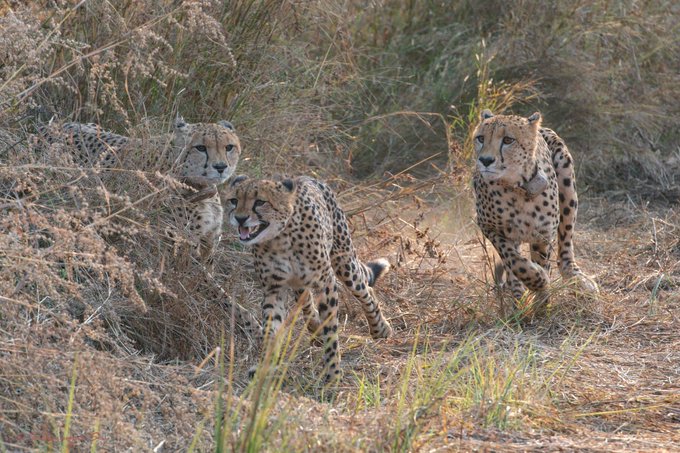
Kuno National Park, located in the Indian state of Madhya Pradesh, has become a success story of conservation efforts with the return of cheetahs. After being declared extinct in India in 1952, the cheetahs have returned to the country, and Kuno National Park has become their new home. The population of cheetahs in the park has now increased to 20, making it a significant milestone in India’s conservation efforts.
The reintroduction of cheetahs in India was a joint effort of the government and various conservation organizations. In 2022, the Indian government announced its plan to reintroduce cheetahs in the country, and Kuno National Park was selected as the first location for the reintroduction. The park has an area of around 750 square kilometers and is rich in biodiversity, making it an ideal habitat for the reintroduction of cheetahs.
| Project Cheetah: चित्रों और वीडियो में नहीं अब खुली आंखों से देखिए रफ्तार के सिकंदर को |
| शाही बाघों का बसेरा है हमारा भारत |

The cheetahs that were introduced in the park were sourced from Namibia, where they were translocated from South Africa in the 1990s. The cheetahs from Namibia were chosen because they are genetically similar to the cheetahs that once roamed the Indian subcontinent. The cheetahs were kept in a specially designed enclosure in the park and were monitored closely by wildlife experts before being released into the wild.
The reintroduction of cheetahs in Kuno National Park was not without its challenges. The park had lost a significant portion of its grasslands due to agriculture and urbanization. The remaining grasslands were fragmented, and there were concerns about the availability of suitable habitat for the reintroduced cheetahs. However, with the help of local communities and stakeholders, the government was able to create a suitable habitat for the cheetahs and ensure their protection from human-wildlife conflicts.

The reintroduction of cheetahs in Kuno National Park has been a significant success. The cheetahs have adapted well to their new environment and have successfully established themselves in the park. The park’s population of cheetahs has now increased to 20, which is a significant milestone in India’s conservation efforts. The success of the reintroduction program in Kuno National Park has also inspired other states in India to consider reintroducing cheetahs in their respective regions.
| Bengaluru Mysuru Expressway: A New Gateway of Development and Connectivity |
The return of cheetahs in Kuno National Park has also had a positive impact on the local community. The park has become a popular destination for tourists, which has created new opportunities for employment and economic growth in the region. The park has also become a source of pride for the local community, who are actively involved in the conservation efforts and are working towards the protection of the cheetahs and their habitat.
The return of cheetahs in Kuno National Park is a success story of conservation efforts in India. It showcases the government’s commitment to wildlife conservation and the restoration of the country’s ecological balance. The success of the reintroduction program in Kuno National Park is a testament to the efforts of various stakeholders, including the government, conservation organizations, and local communities. The reintroduction of cheetahs in Kuno National Park is not only a significant milestone in India’s conservation efforts but also a source of inspiration for other countries around the world.



